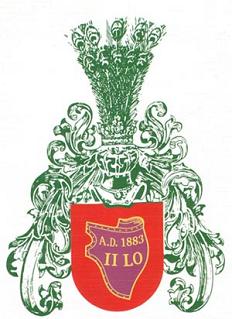
Jan Cybis (16 February 1897 - 13 December 1972) was a prominent Polish painter and art teacher.

Jan Cybis (16 February 1897 - 13 December 1972) was a prominent Polish painter and art teacher.
Cybis was born in Fröbel (now Wróblin, Opole Voivodeship, Poland) and studied at the Jan Matejko Academy of Fine Arts in Kraków, settling in that city from 1934. [1] The German Expressionist Otto Mueller was his mentor. [2] He studied under Józef Pankiewicz among others, developing a reputation for a post-impressionist style using rich, saturated color influenced by the French. [3]
In the 1930s Cybis was among the most prominent of the Kapists or Paris Committee, a significant group of Polish painters of the time. His wife Hanna Rudzka-Cybisowa (1897-1988) was a notable painter in her own right and also active as a Kapist. [4]
Among other recognitions, Cybis was awarded the Polish communist government's Order of the Banner of Work in 1949 and the Medal of the 10th Anniversary of People's Poland in 1955, although during the Socialist Realism period Cybis was prevented from teaching for ideological reasons. [5] Among his notable students was Tadeusz Dominik.

Cybis is buried at the Powązki Military Cemetery in Warsaw. His memoirs were published in 1980.
Since 1973 the Association of Polish Artists and Designers (Polish acronym ZPAP) has issued a prestigious annual Jan Cybis Award to Polish visual artists for creative achievement. Its recipients include: [6]

Jacek Józef Dukaj is a Polish science fiction and fantasy writer. His fiction explores such themes as alternate history, alternative physics and logic, human nature, religion, the relationship between science and power, technological singularity, artificial intelligence, and transhumanism. He is regarded among the most popular Polish contemporary science fiction authors.

The Polish Mathematical Society is the main professional society of Polish mathematicians and represents Polish mathematics within the European Mathematical Society (EMS) and the International Mathematical Union (IMU).
Romanticism in Poland, a literary, artistic and intellectual period in the evolution of Polish culture, began around 1820, coinciding with the publication of Adam Mickiewicz's first poems in 1822. It ended with the suppression of the January 1863 Uprising against the Russian Empire in 1864. The latter event ushered in a new era in Polish culture known as Positivism.

The Poland men's national basketball team represents Poland in international basketball competitions. They are controlled by the Polish Basketball Federation (PZKosz).

The Nike Literary Award is a literary prize awarded each year for the best book of a single living author writing in Polish and published the previous year. It is widely considered the most important award for Polish literature. Established in 1997 and funded by Gazeta Wyborcza, Poland's second largest daily paper, and the consulting company NICOM, it is conferred annually in October. It is open for nominees from all literary genres, including non-fiction essays and autobiographies.

King John III Sobieski 2nd High School is a high school in Kraków, Poland. It was founded in 1883.

How I Unleashed World War II is a 1970 Polish comedy film directed by Tadeusz Chmielewski and based on Kazimierz Sławiński's novel "Przygody kanoniera Dolasa". It was shot in Sochi, Baku, Poświętne and Łódź, among other places.
The Chopin University of Music is a musical conservatorium and academy located in central Warsaw, Poland. It is the oldest and largest music school in Poland, and one of the largest in Europe.

Kisiel Prize or Kisiel Award is an annual Polish award presented in three categories: publicist, politician/public figure and entrepreneur whose actions most closely portray the spirit and beliefs of the Polish publicist and politician, Stefan Kisielewski (1919-1991).
Szymon Krzeszowiec is a Polish violinist, chamber musician and pedagogue. Musician of the Silesian String Quartet and member of the Trio Aristos.

Art in Poland refers to all forms of visual art in or associated with Poland.
The Polish Film Academy is a professional honorary organization dedicated to the advancement of the arts and sciences of motion pictures.

Hanna Rudzka-Cybisowa (1897-1988) was a Polish artist and teacher.
The Jan Karski Eagle Award was established on 5 May 2000 by Polish professor Jan Karski (1914–2000), war courier of the Polish government in-exile, witness of the Holocaust and Righteous Among the Nations. Karski wanted this award to go to those who "can worthily worry about Poland" and to those who "although aren't Polish, wish good to Poland". The award has an honorary character and there is no monetary award granted with it, because, as the originator argued, "dignity is incalculable in money". It is symbolized by the Eagle statuette, the project of which was approved by Jan Karski. The organisation side of the award was gifted to Waldemar Piasecki.